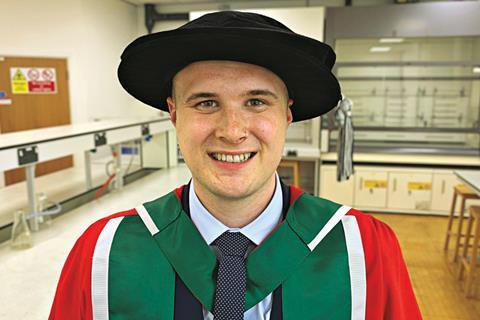Owain Beynon’s new words for computational chemistry terms are now in the Welsh dictionary

As the first person to complete a chemistry PhD entirely in Welsh, Owain Beynon had the joy of creating new scientific vocabulary when he came across gaps in terminology. His words have now been added to the official Welsh dictionary.
Beynon attended Welsh-speaking schools in Carmarthenshire, before doing a master’s degree in chemistry at Cardiff University. While arranging his PhD, he came across the organisation Coleg Cymraeg Cenedlaethol, which aims to ‘inspire and encourage everyone to use their Welsh skills, with the aim of creating a bilingual workforce’.
Together with his PhD supervisor, he successfully applied for PhD funding from Coleg Cymraeg Cenedlaethol’s Ysgoloriaeth Ymchwil scheme, which supports PhD students in conducting research and writing a thesis through the medium of Welsh.
Beynon was keen to demonstrate that Welsh is a scientific language, despite many considering English the only option for higher education and research.
Hurdles
His supervisor didn’t speak Welsh, but they overcame this ‘small hurdle’ by having a second supervisor, a Cardiff medic who had previously done a PhD in chemistry. ‘We would chat through the science in Welsh,’ Beynon recalls.
For his research, he used computational science to see how porous materials could be used for green energy processes and sustainable chemistry. He soon discovered a lack of key Welsh terminology – especially for computational chemistry. ‘I would start writing or I’d do the research and realise that there are some gaps,’ he says. Fortunately, Coleg was able to help, putting him in touch with experts. ‘So I would think of a word, write down an idea of what the translation would be and then I would send it off to some terminologists at Bangor University.’
After some back and forth and sometimes reaching out to other Welsh speaking chemists, they would reach consensus on a term, at which point it was added to the dictionary. ‘It’s quite a cool process,’ Beynon says.
In some cases, designing new words was a ‘linguistical minefield’, as direct translations didn’t always convey meaning accurately. For terms such as density functional theory, where functional is a general adjective in English but also a function of a function in maths, context was vital for deciding the correct translation.
‘They are standardised terms now,’ he says. Density functional theory is damcaniaeth dwysedd ffwythianolion in Welsh. Other terms include brasamcan graddiant cyffredinol for a general gradient approximation and dull gwahaniaeth feidraidd for finite difference method.
Welsh language science
He considers his thesis ‘a valuable contribution to Welsh language science’. It doesn’t contain any English words, with Beynon deciding against putting some English terms in brackets as the meaning of the new terms was intuitive from the context in which they were used. All of the journal publications associated with his research are in English, so he has no concerns about his research being accessible.
Beynon’s PhD viva was also in Welsh, with Dewi Lewis from University College London (UCL), an expert in computational chemistry and zeolites, and Ifan Stephens, who works on electrochemistry and renewable energy at Imperial College London, as his examiners. ‘It was very fortunate that I had people who are not only experts in my field but also speak Welsh,’ says Beynon.
Beynon is now employed as a postdoctoral research associate in the Institute for Materials Discovery at UCL, continuing his research into materials using computational and data-driven methods.
He stays in touch with a ‘nice network’ of Welsh speaking scientists, through Coleg. Every year the organisation runs a science conference to provide an opportunity for scientists to showcase their research in Welsh. The conferences cover a wide range of topics, with a simultaneous translation service available.
‘It’s nice because we get to chat about exciting science through the medium of Welsh,’ says Beynon.
He is keen to inspire other Welsh-speaking scientists and has already been contacted by some students at Cardiff interested in submitting their theses in Welsh. He likes the thought that Welsh speaking scientists are now thinking: ‘this is possible, we can do this.’
If the opportunity arises, Beynon would one day like to lecture chemistry in Welsh. He is heartened by the fact that Cardiff now has two Welsh speaking lecturers, with some teaching available in Welsh, which was not the case in his undergraduate days.
For now, he is enjoying the fact that he is known at UCL as the man who did his PhD in Welsh. ‘People think it’s cool and I think it’s quite cool too.’












No comments yet